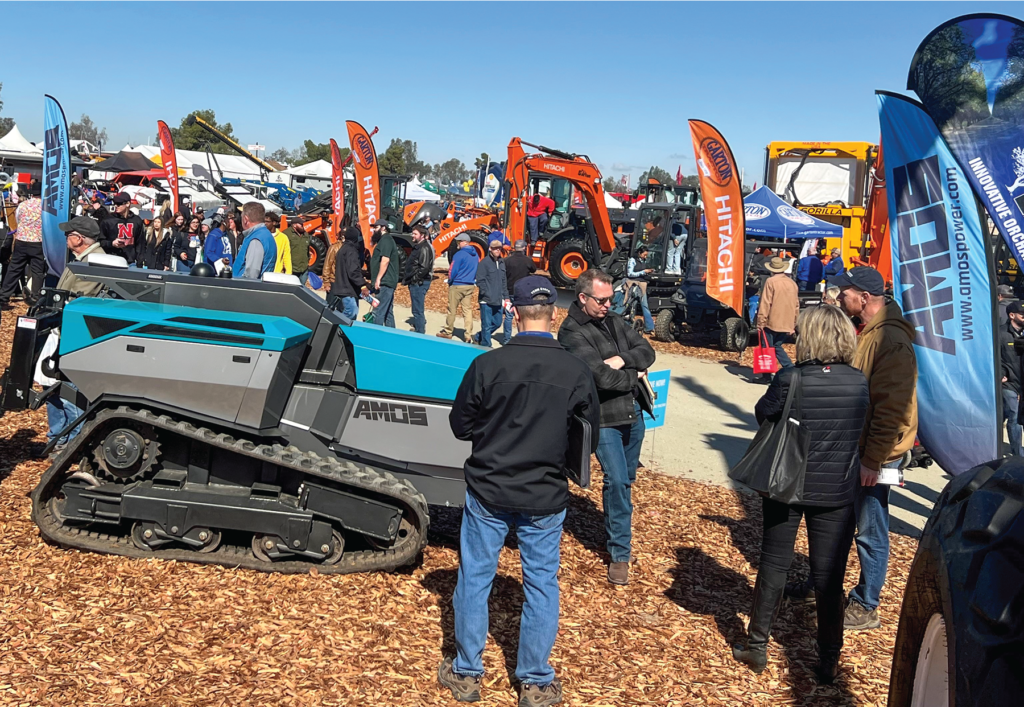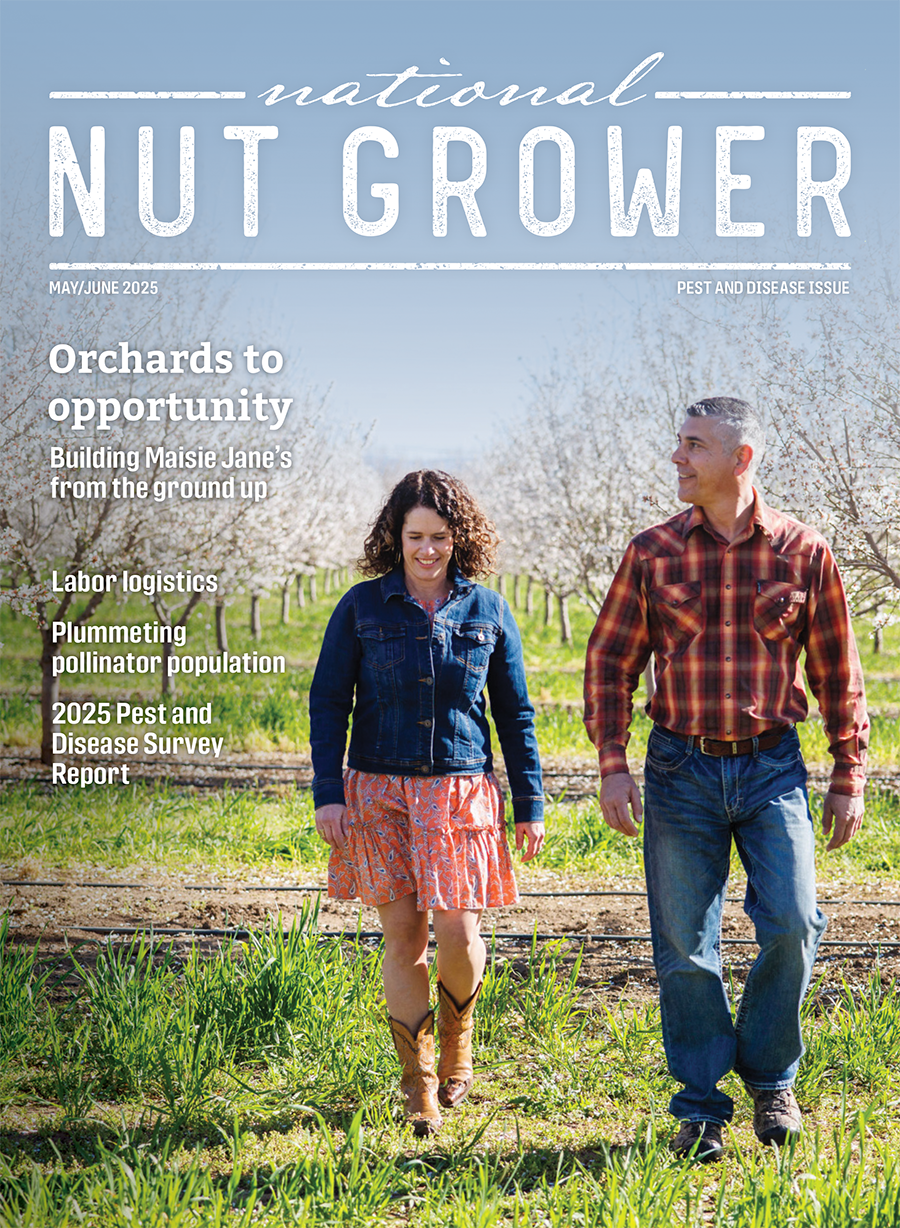Mar 1, 2023Farmers tout technology as essential for growing future
Growers beset by high cultivation costs are turning more consistently to technology to provide relief on multiple fronts, a trend that is here to stay.
More than 100 exhibitors at the World Ag Expo, held Feb. 13-15 in Tulare, showcased their agricultural technology, such as behemoth tractors and implements, with demand for outdoor demonstration spaces nearly exceeding supply across 2.6 million square feet of space.
Citing concerns about the cost and reliability of labor, water restrictions, increased regulations and the need to streamline tasks, more farmers are considering and often adopting new practices.

“It’s comfortable coming out here each year because I can see what new products are available,” said citrus farmer David Johnson of Sanger. “I am looking for anything with automation that can help in saving water and labor costs.”
Technology, some in initial stages of development and others fully implemented, were on display spanning all facets of farming, from irrigation management software to autonomous sprayers, fruit-picking robots and electric tractors. Curious onlookers took lengthy cellphone videos or simply stood in wonder as self-driving tractors with empty seats made loops in front of them.
Felix Braeuel, CEO of KARL, a startup based in Copenhagen, Denmark, arrived at the show to connect with farmers, investors and industry professionals. The company’s intelligent scheduling application will coordinate daily tasks for a farming operation based on weather, soil moisture and more.
“This is our first time showing our product to American farmers,” Braeuel said. “We are looking for a soil irrigation sensor to integrate into our model. We are in the stage now where we are ready to push the technology and find those willing to help us test it.”
After attending a few seminars, Braeuel left with a connection to Fresno State University’s Center for Irrigation Technology, where the application will undergo more testing in the field.
Agtonomy, a farm tech firm based in South San Francisco and Sonoma County, debuted its autonomous tractor amid a small plot of transplanted grapevines. It deployed a sprayer filled with water to show how the vehicle can navigate terrain.
CEO Tim Bucher, a Northern California grape grower and engineer, designed the tractor and accompanying software known as TeleFarmer as a way to reduce his own farming costs.
“The pain kept getting greater in farming,” he said. “Through the decades, I had to bring the technology to the crop because we are all trying to do more with less and farm in a more efficient way.”
He said most farmers would like a clone of themselves to manage daily tasks. But the technology must be easy to use and work in a messy, chaotic farming environment.
“I told my developers that they had to think of the farmer first,” Bucher said. “I wanted to give farmers a solution to duplicate themselves and keep them in control of their operation. Most farmers have a smartphone, so I made sure our app was designed to be used from the cab of pickup. Ease of use is critical.”
Kern County farmer Jack Frey watched the Agtonomy display for several minutes.
“Stuff like this takes a lot of thought,” he said. “It’s got great potential with the way safety regulations are forced on us, and looks like the most economical option when you consider the cost of minimum wage, safety training and workman’s comp.”
Frey said he could envision a similar setup on his own ranches, where he farms carrots, potatoes, pistachios and more. “If it allows you to have four pieces of equipment running with one operator, that is a benefit,” he said.
One concern is not being able to find human help that may be needed at various times throughout the year.
“There is a balance to be found between mechanization and humans to handle various tasks,” Frey said. “I wouldn’t want to eliminate help and then try to find an organization to get the work done.”
Standing near a shiny fleet of tractors and GUSS Automation, Greg Christensen, marketing manager for the John Deere 5 Series and high-value tractors, said incorporating technology is not a generational issue.
“It is the sheer challenge of getting people on the farm,” he said. “Autonomous vehicles can spray 24/7, they don’t call in sick, and they are reliable. They can spray the same way every time. This is a huge step for farming.”
Some farmers learned how to avoid common mistakes when incorporating technology at the “How to Adopt Ag Technology” seminar.
Tom Devol, field outreach and education senior manager at the Almond Board of California, encouraged farmers to research and think through their investment in technology. He advised four steps: make a plan; pick a champion to execute the plan; select the technology; and validate the data.
“So often, we get caught up in the pieces of hardware,” he said. “We forget that once you install a sensor in the field, hopefully that is the last time you look at it. To engage with the sensor, we must use the software platform. If you can’t use the software, your experience will not be a good one. Software is the most important part of the solution.”
He said other tips are to make sure farm staff is trained and willing to use the technology, know what type of field service is available should the technology malfunctions and make the sure the technology will grow with the farming operation.
Tom Shapland is CEO of Tule, an irrigation firm that uses sensors to measure water used by crops and offers a program that allows grape growers to take midday leaf water potential readings using a smartphone camera. He said farmers who have success incorporating technology are curious, energetic, ambitious and fearless.
“There is so much that needs to go on in the field that it requires a lot of extra work to take on new initiatives,” he said. “Successful farmers who take on these extra initiatives want to make more money and get more done.”
But Shapland cautioned, “Be comfortable with failure, especially publicly,” explaining, “We’re talking about farming here. It is inevitable that something will not go according to plan.”
Frey, the farmer from Kern County, said new technology is necessary if growers are to keep meeting global food demands.
“It’s good that they want to try to innovate,” he said. “We always need to try to do a better job.”
— Lisa McEwen, AgAlert/California Farm Bureau Federation









